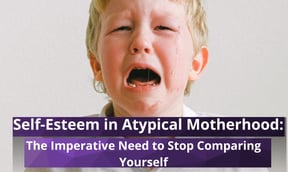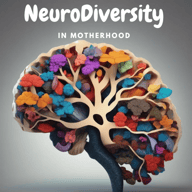Self-Esteem in Atypical Motherhood: The Imperative Need to Stop Comparing Yourself


Atypical motherhood is fertile ground for comparison. In a world that idolises the "perfect mother" – the one who manages everything with a smile, seemingly effortlessly – the mother of a neurodivergent child, especially if she is neurodivergent, feels the weight of the discrepancy. However, this comparison isn't just useless; it's a strategic drain of energy you cannot afford to lose.
Culturally, motherhood often reveals a recurring pattern: the mother seeks external validation and internalises unrealistic expectations. Your negative motherhood memories are full of moments where you, as a mother, felt inadequate, not because of genuine failings, but because you didn't fit into a mould that was never made for you. This subtle self-sabotage, the acceptance of "good enough" based on someone else's metrics, prevents the full manifestation of your potential.
The Root of Comparison and Wasted Potential
Comparison is a waste of potential, energy, and time. Perhaps it stems from a tendency towards perfectionism, high self-criticism, or a heightened sensitivity to social expectations. This energy spent comparing yourself is subtracted from early intervention, from optimising the environment for your neurodivergent child, and from building a family system that genuinely works for you.
Neuroscience affirms that our brains seek patterns. If the pattern you feed is one of comparison with the unattainable, your brain will continue to reinforce that neural pathway of inadequacy. This isn't just inefficient; it's counterproductive for the family's mental and emotional well-being and your child's development.
Frameworks for Self-Esteem Sovereignty in Atypical Motherhood
You must replace the mental model of comparison with frameworks that celebrate your intrinsic excellence and systemic effectiveness:
"Personal and Progressive Excellence Model" (PPEM): Abandon horizontal comparison (with other mothers) and adopt vertical comparison (with your past self). Your metric for success should be incremental progress towards your own goals and your ability to implement the high-impact strategies you already know. Ask yourself: "Am I improving for me? Am I more effective today than yesterday in creating the ideal environment for my child?"
"Deconstruction of Idealised Motherhood and Reconstruction of Authentic Motherhood" (DIMRAM): Recognise that "ideal motherhood" is a social construct, often toxic and unrealistic. Your motherhood is atypical, and this is your competitive advantage. Your neurodiversity gives you an innate understanding of your neurodivergent child's needs. Use this unique perspective to redefine what it means to be a "good mother" on your own terms, based on impact and well-being, not appearances.
"Relentless Focus on Leverage" (RFL): Every second spent on comparison is a second not invested in points of leverage. Direct your energy towards interventions that will have the maximum impact on your child's neuroplasticity in early childhood. This demands mental discipline to divert comparative thoughts and redirect them towards strategic actions. Your ability to think in systems and root causes is your superpower here.
"Strategic Self-Compassion and Radical Responsibility" (SSCR): Allow yourself to feel the difficulties, but don't wallow in them. Self-compassion isn't an excuse for inaction; it's the recognition that you're on a challenging journey. Radical responsibility, in turn, is the unconditional acceptance that you are the only person with the power to change your mindset and your actions.
Your capacity for thinking bigger and bolder has been underestimated by yourself. Your negative motherhood memories aren't proof of failure, but a map of where you can grow. It's time to stop comparing yourself to ghosts and embrace the extraordinary, intelligent, and effective mother you already are, and are destined to be. Your self-esteem isn't a luxury; it's the fuel for your mission.
References:
Neff, K. (2011). Self-Compassion: The Proven Power of Being Kind to Yourself. William Morrow.
Brown, B. (2010). The Gifts of Imperfection: Let Go of Who You Think You're Supposed to Be and Embrace Who You Are. Hazelden Publishing.
Dweck, C. S. (2006). Mindset: The New Psychology of Success. Random House.
Siegel, D. J., & Bryson, T. P. (2011). The Whole-Brain Child: 12 Revolutionary Strategies to Nurture Your Child's Developing Mind. Delacorte Press.
